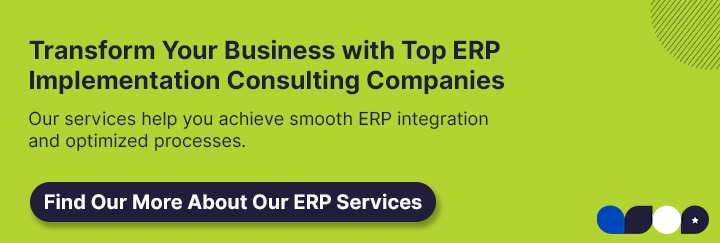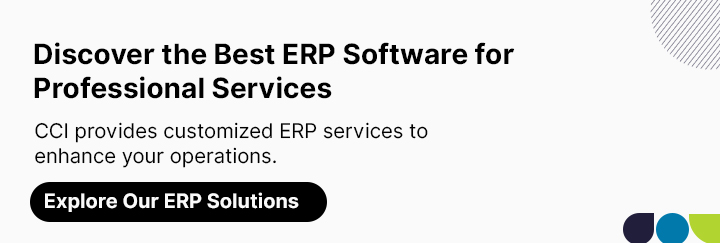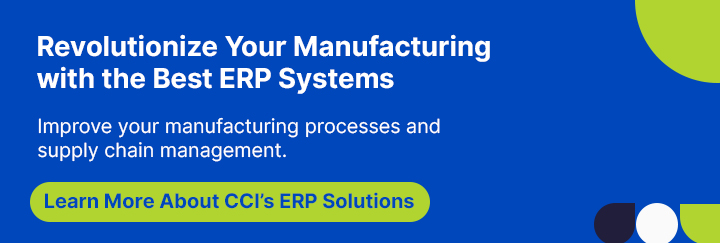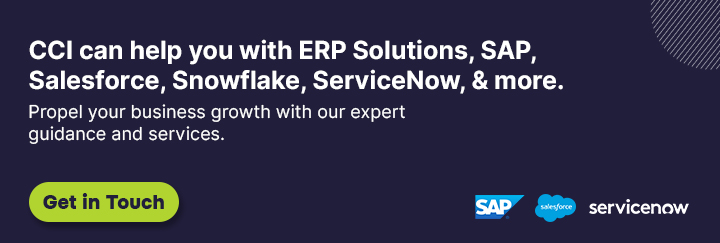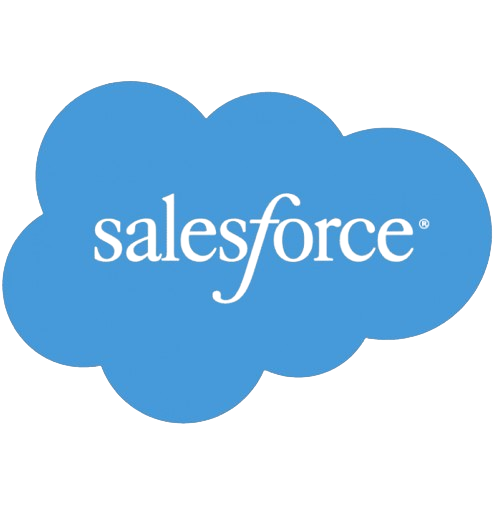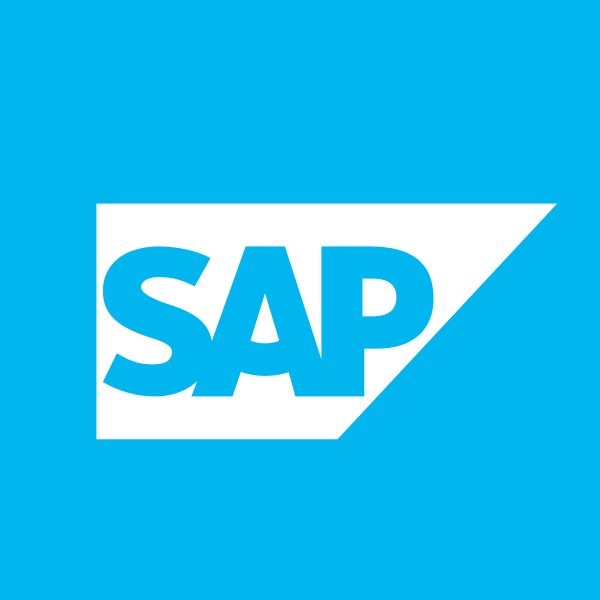Best ERP Systems For Construction Industry in 2026
Updated on March 2, 2026
Every construction project involves multiple moving parts. Many things can go wrong, from planning and design to construction and post-construction management. The most significant challenges often arise from disjointed systems, miscommunication, and manual processes that can’t keep up with the industry’s pace. Best ERP software helps construction businesses take control by centralizing every important task into a single, manageable system.
But choosing the suitable ERP for your business isn’t easy. There are countless solutions on the market, each with strengths and weaknesses. That’s why we’re here to guide you through the most effective ERP solutions for construction in 2026, helping you find the perfect fit for your business needs.
Benefits of ERP Systems for the Construction Industry
If you’ve ever worked on a construction project, you know how quickly things can spiral out of control. Costs can balloon, timelines can stretch, and communication between stakeholders can break down. ERP software addresses these issues head-on, offering several benefits that can transform your business’s operations.
Centralized Data and Project Management
One of the most potent benefits of ERP software is that it centralizes all project information. Imagine having every piece of information about a project—timelines, costs, labor, equipment—stored in one place. This means you can see the whole picture of your project at any given time. No more scrambling to find documents or figuring out where a project stands.
Improved Communication Across Teams
ERP implementation services help ensure everyone involved, from architects to project managers and contractors, stays informed. Whether it’s sharing design changes or updating schedules, ERP software helps prevent costly delays caused by miscommunication. It bridges the gap between different teams, giving everyone access to the same information.
Better Budget Control
In construction, costs can quickly spiral out of control. Material shortages, unexpected labor costs, and weather delays can affect profits. ERP software allows you to keep track of expenses in real time, giving you the tools you need to stay on top of your budget. By monitoring where money is being spent and making informed decisions, you can prevent budget overruns before they happen.
Compliance and Risk Management
Construction industry regulations are strict, and failing to meet them can be disastrous. Compliance is critical, whether health and safety requirements, environmental standards, or labor laws. ERP software helps ensure your business stays compliant by tracking regulations and generating reports to prove adherence.
Scalability for Growing Businesses
As your construction business grows, managing projects becomes more complex. ERP software development solutions are built to scale your company, meaning they can handle the additional workload, employees, and projects as you expand. Whether taking on more clients, more significant projects, or entering new markets, an ERP system will grow with you, ensuring you don’t miss a beat.
>> Related Post: ERP Implementation Consulting Services: Your Path to Operational Excellence
Qualities of ERP Systems/Software for the Construction Industry in 2026
In 2026, the top ERP software options offer features particularly well-suited to construction companies of all sizes. Here’s what to look for when choosing your ERP system:
User-Friendly Interface
Construction teams often include people with varying levels of tech skills. Your ERP software should be intuitive and easy to navigate so everyone on your team can use it efficiently. An overly complicated system or one that requires extensive training can slow down adoption and reduce the software’s effectiveness.
Real-Time Data Access
Construction projects move quickly, and your ERP system should keep up. Real-time data access means that every team member has the latest information, whether on-site, in the office, or working remotely. Accessing real-time data is crucial for making quick decisions and keeping the project on track.
Customization Options
No two construction projects are alike, and neither are construction companies. The best ERP software will allow you to customize workflows, dashboards, and reports to fit your needs. From tracking costs to managing employee schedules, the ability to adapt the software to your business is critical to getting the most out of it.
Integration with Other Tools
Chances are, your construction company already uses various software solutions, such as accounting tools, project management apps, or customer relationship management (CRM) systems. Your ERP software should integrate smoothly with these tools, ensuring that data flows across platforms and reducing the need for manual data entry.
Mobile Access for Field Workers
ERP software that offers mobile access allows your workers to input data, check schedules, and communicate updates from their phones or tablets, no matter where they are. This feature is essential for ensuring real-time updates from on-site teams.
>> Related Post: Top ERP systems for the manufacturing industry in 2026
7 Best ERP Systems/Software for the Construction Industry in 2026
1. Sage
Sage is one of the most trusted names in construction ERP software. Known for its powerful financial management tools, Sage helps construction businesses of all sizes stay on top of their accounting and project management needs.
Benefits:
- Strong financial management capabilities
- Excellent project tracking features
- Great for small and medium-sized construction firms
Limitations:
- Limited mobile functionality
- It is not as feature-rich for large, complex projects
Pricing:
Sage pricing starts at around $10,000 annually for small businesses but can vary depending on your company size and specific needs.
2. ServiceNow ITSM
Although primarily used for IT service management, ServiceNow ITSM is gaining traction in construction due to its excellent process automation and asset management features.
Benefits:
- Advanced process automation
- Great for managing multiple complex projects
- Real-time data access
Limitations:
- Steeper learning curve for new users
- Higher cost, especially for smaller businesses
Pricing:
ServiceNow ITSM pricing typically ranges from $30,000 to $50,000 annually, depending on the size of your business and the level of customization required.
3. Viewpoint
Viewpoint is a cloud-based ERP system designed specifically for construction companies. It provides solutions for accounting, project management, and human resources, all in one place.
Benefits:
- Comprehensive construction-specific features
- Cloud-based, allowing for easy access from anywhere
- Excellent customer support
Limitations:
- It can be expensive for smaller firms
- Limited integration with third-party apps
Pricing:
Viewpoint pricing starts at approximately $2,000 per month, with additional costs for premium features.
4. ClickUp
ClickUp is not just for construction—it’s a general project management tool that has gained popularity in the industry due to its flexibility and ease of use.
Benefits:
- Highly customizable workflows
- Affordable for small to medium businesses
- Great for task management and team collaboration
Limitations:
- Not specialized for construction
- Lacks some advanced financial tools needed for large projects
Pricing:
ClickUp starts at $5 per user per month, making it one of the more affordable options for smaller firms.
5. Microsoft Dynamics 365 Business Central
Microsoft Dynamics 365 Business Central is a comprehensive ERP system that works well for more extensive construction firms with more complex needs. It offers everything from project management to financial oversight.
Benefits:
- Scales well with large companies
- Integrates easily with other Microsoft products
- Comprehensive financial tracking
Limitations:
- Higher cost, particularly for smaller businesses
- Requires technical support for initial setup
Pricing:
Pricing starts at around $70 per user per month, with extra costs for additional features or customization.
6. SAP Business One
SAP Business One is a trusted name in the ERP world, known for its powerful tools for large enterprises. For construction companies, it offers excellent project management and financial tools.
Benefits:
- Great for large, complex projects
- Advanced project management tools
- Customizable to fit your company’s needs
Limitations:
- Expensive, making it difficult for smaller firms to justify the cost
- Complicated
Pricing:
Pricing for SAP Business One typically starts around $100 per user per month.
7. Oracle Primavera
Oracle Primavera is one of the most efficient ERP solutions for large construction projects. It’s known for its advanced scheduling and project management tools.
Benefits:
- Best for large-scale construction projects
- Advanced scheduling and project management features
- Customizable and scalable
Limitations:
- Expensive, particularly for smaller businesses
- Overwhelming for small projects or companies
Pricing:
Oracle Primavera pricing is higher, starting at around $3,000 per user per year.
>> Related Post: Top ERP software for small businesses in 2026
ERP for Construction Industry Offered by CCI
Cloud Consulting Inc. (CCI) offers specialized ERP solutions for the construction industry. These solutions help businesses improve project efficiency, manage budgets, and enhance team collaboration. Our ERP services incorporate new ERP trends and provide an all-in-one platform to handle everything from financial management to real-time project tracking.
Conclusion
The importance of choosing the right ERP software for the construction industry cannot be overstated. Professional ERP solutions can take your construction business to the next level with real-time updates, better budget control, and improved team communication. Whether you’re a small business or a large construction firm, the ERP options listed in this blog offer powerful features that can meet your unique needs. Consider your budget, business size, and specific project requirements when selecting the right ERP software to ensure long-term success.
FAQs: Best ERP Software for the Construction Industry
1. What is the most important feature to look for in construction ERP software?
The most important feature to look for is project management functionality that allows you to track budgets, schedules, and teams in real time.
2. Can small construction companies afford ERP software?
Yes, there are affordable ERP solutions tailored to small businesses, such as ClickUp and Sage, which offer scalability and cost-effective pricing models.
3. How does ERP software help with compliance?
ERP software tracks regulations and ensures that all necessary documentation is in place, helping your company stay compliant with industry standards.
4. What’s the difference between cloud-based and on-premise ERP systems?
Cloud-based ERP systems are hosted online, making them accessible from anywhere, while on-premise systems are installed on local servers, offering more control but requiring more maintenance.
5. How can ERP software improve project timelines?
By centralizing data and improving communication across teams, ERP software helps prevent delays and ensures that projects stay on schedule.
